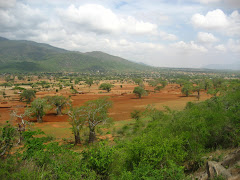The dust has finally settled after our event and the numbers are in: for World AIDS day 2008, a total of 1,251 people were tested for hiv; 9 were positive. Hundreds and hundreds of hiv educational materials (books, pamphlets, and posters) were distributed; there was fierce competition for Tony’s hand-sewn AIDS ribbons and for the t-shirts we had printed (the t-shirts read: Ninajua Afya Yangu. Na Wewe Je? This translates as: ”I know my health. How about you?”) We showed hiv-related videos and held the first-ever candlelight vigil; people publicly told their stories about becoming infected with hiv, which is brave in any country, and there was lots of singing and drumming. There were small bouts of drama over the three day event, which we now understand is normal, and our garden hose got stolen when we weren’t at home, but all in all, I am proud of this project. It’s impossible to know the impact of our presence here, but I’m hoping that with every hiv-related thing we do we are raising awareness of the magnitude of this disease in Tanzania.
In other project news: I managed to show 8 of the 10 planned hiv-related videos at the secondary school before running into a snag. Towards the end of the school year, which is late November, the students have final exams, plus they start helping their parents to prepare the fields for farming; the last few videos were poorly attended because so few students were still in town—most left school early to get started on farming. Good lesson to learn. I will show the final two videos to our hiv support group, which is called Kikundi cha Upendo (which means “Club of Love”). We have been spending a lot of time with that group, which consists mostly of people living with hiv or AIDS; we talk about nutrition, health issues, medication issues, stigma, and anything else related to hiv. It’s hard to believe, but many, many people here (not only in Kibakwe, but I’m guessing in Tanzania as a whole) do not understand how they were infected with hiv, and they do not understand the progression of the disease and the need to stay as healthy as possible (and avoid other diseases, like malaria or diarrhea, which are particularly hard on people without fully functioning immune systems). I am inspired by so many people that I have become friends with who are infected with hiv; many of them have come to accept their disease without anger or resentment, and are eager to help educate others. They are the sole reason I am here.
The rains have started! We have had 5 or 6 big, hard rains, and everything is turning green: our living fence came back to life, the mountains look like broccoli, Tony is working in the garden every day (pulling weeds, preparing beds, planting seeds—the sunflowers have already sprouted!), and our beloved giant zambarau tree (remember from last year? It’s a plum tree) has begun raining tiny purple plums all over our yard. It’s amazing how the rain and clouds improve my mood and outlook here—like we were all dying of thirst and now we’re coming back to life. It’s hard for those of us who don’t farm for a living to understand the absolute necessity of rain—imagine putting ALL YOUR FAITH in the rain, all your hopes for food and money (from selling your crops) for your family’s well-being. Water is life, and living here has illustrated that in ways I could never imagine.
Pipi my beloved kitten is doing very well. She is probably about one year old by now, and has gotten very courageous about exploring; she climbs trees (with the great ambition of catching a bird, but so far hasn’t gotten one) and hunts with tenacity (lizards, insects and mice are her preferred objects of prey.) She still purrs more than any cat I have ever known, and sleeps curled up against my body every single night. I love her.
How’s my mood? Up and down, quite truthfully, which has been the case ever since I got here 1½ years ago. I’m proud of how far I’ve come; I’m proud that I can speak Swahili, and I’m proud that I’ve managed to live in a difficult environment for as long as I have. I’m sad that I’ve missed so many happy things back home (babies being born, friends buying houses, friends falling in love, friends getting married), and when I have a case of the blues here, realizing all those things that I’m missing is extra sad. We won’t be on the beach this year for Christmas, but we’ll be in Dar es Salaam with Peace Corps friends, enjoying some luxuries that we usually live without. Some dear friends from home are coming to visit us after Christmas, and we are counting the minutes until they get here. So—we’re in the home stretch of this phase of our lives, and have started setting our sights on the next goal (grad school and MAYBE a baby, if you can believe it). I hope this update finds you happy and healthy and grateful for everything you have. Ninakutakia heri ya Krismas na mwaka mpya (“I am wishing you the happiness of Christmas and the New Year.”)
